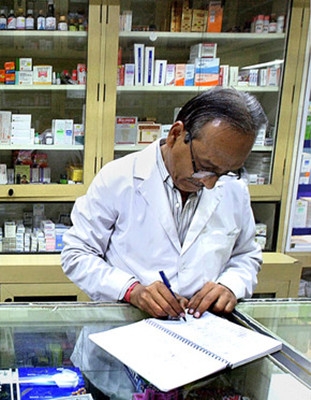商業報道
Social entrepreneurship in India
印度的公益創業
Cut from a different cloth
開辟出另一片天地
Building a business around solving a chronic female health-care problem
創立產業以解決長期困擾的女性保健問題
RATAN JADHAV, a shy, slight woman in her 30s, works on a farm in Osmanabad, a remote part of the western Indian state of Maharashtra.
年過三十的Ratan Jadhav是一個害羞,纖弱的女性。她在印度奧斯曼阿巴德的一個農場工作,那里是印度馬哈拉斯特拉邦的偏遠地區。
 Her tiny mud-brick house boasts such modern conveniences as a computer bought with a loan from relatives, while arranged neatly on the kitchen window sill are her teenage daughter's cosmetics.
Her tiny mud-brick house boasts such modern conveniences as a computer bought with a loan from relatives, while arranged neatly on the kitchen window sill are her teenage daughter's cosmetics.
一臺向親戚借款而買的電腦也給住在低矮泥磚房的她帶來了一絲現代生活的便利,而放在廚房窗臺上女兒的化妝品則顯得整齊有序。
Yet when it comes to personal hygiene, both women prefer a cotton rag to a branded sanitary pad.
然而當提及個人衛生問題上,這兩位女士都偏愛棉布勝過品牌的衛生護墊。
Why buy one, asks the mother, when a homespun substitute does the job?
母親不解:自己做的東西就可以替代衛生巾,為什么還要買這個?
Ms Jadhav is one of300mmenstruating Indian women who eschew sanitary pads in favour of rags, dry leaves, straw or newspapers.
印度有300萬月經來潮的女性用碎布,干葉,枯草或者報紙來替代衛生棉條,Jadhav女士就是其中一位。
AC Nielsen, a research firm, says that 70% of women in India cannot afford sanitary products.
一家名為AC Nielsen的研究公司稱,印度70%的女性買不起衛生用品。
Many who can pay do not, as they hate having to ask for them in drugstores that are usually run by men.
即使付得起,很多女性也拒絕購買。他們恨透了向藥店人員索要衛生棉條,因為這些商店通常是由男性經營。
This has serious consequences.
這個情況后果嚴重。
Adolescent girls miss up to 50 days of school a year.
印度的青春期女孩每年曠課高達50天。
Some 23% drop out altogether.
大約23%的女生干脆完全退學。
Working women lose their daily wages.
上班族女性也會因月經缺勤被扣掉當日工資。
The social and economic benefits to be had from resolving this problem are potentially so large that doing so is now a focus of social entrepreneurs in many developing countries.
解決這個問題在經濟和社會上的潛在利益是十分巨大的。
They include Jaydeep Mandal and Sombodhi Ghosh of Aakar Innovations, a Delhi-based start-up.
對于許多發展中國家,解決這個問題是公益企業家現在關注的一個焦點。
They have developed a machine that produces low-cost sanitary napkins using as raw materials agri-waste such as banana fibre, bamboo and water-hyacinth pulp.
企業家們已經研發出一種可以生產廉價衛生棉的機器。該棉條使用的原材料為工業廢品,比如香蕉纖維,毛竹以及水葫蘆紙漿。
Each machine can churn out 1,600-2,000 pads a day, to be sold for 40% less than branded mass-market products.
每臺機器每天可以制造出1600-2000個棉片,出售價格比暢銷的品牌產品要低出40%。
To bypass the current female-unfriendly distribution system, Aakar aims to sell its machines for 250,000 rupees a time to groups of women.
為了避開當前對女性不利的流通體系,Aakar公司計劃以每臺25萬盧布的價格出售該機器給特定群體的女性。
The finished item will be sold door-to-door by village saleswomen who also hawk solar lamps, stoves and saris.
這種成品將由村民中的女銷售員進行上門推銷。她們還會兜售太陽能燈具,爐灶和印度莎麗服。
It will be distributed, too, in women-run grocery stores and beauty parlours.
由女性經營的雜貨店和美容院中也會有該機器出售。
Aakar hopes to profit by selling the raw materials and the machines.
公司Aakar希望能從銷售原材料和該機器中獲得利潤。
This is hardly a new idea.
這不是什么新點子。
Arunachalam Muruganantham, another Indian entrepreneur, is a pioneer of low-cost pad manufacturing.
另一個印度企業家Arunachalam Muruganantham是廉價衛生棉條產業的先驅人物。
Gandhigram, a non-profit organisation in Tamil Nadu, has developed similar technology in partnership with engineers at the Indian Institute of Technology in Madras.
位于印度泰米爾納德邦的非營利性組織Gandhigram已同位于馬德拉斯的印度技術研究院的工程師共同合作研發出類似的工藝技術。
Goonj, an NGO, sews and sterilises discarded old clothes into sanitary pads.
民營機構Goonj則將廢棄的舊衣服進行縫紉消毒制成了衛生護墊。
Many start-ups process cotton fibre from old knitwear into pads.
許多新興企業通過加工棉布纖維將舊的針織品制成了護墊。
Mr Muruganantham reckons that the country is awash with hundreds of local brands.
先生Muruganantham認為印度已經充斥著成百上千種本土品牌的衛生護墊了。
Yet, unusually, Aakar's product meets the standards of the Western world and can compete with all global brands, says Ronald van het Hof of Women on Wings, a Dutch-based consultancy focused on creating jobs for women.
來自揮著翅膀女人的Ronald van het Hof稱,Aakar的產品卻出乎意料的達到了西方國家的衛生標準并且可以與所有的國際品牌一較高低。揮著翅膀的女人是一個位于荷蘭的咨詢公司,其致力于為女性增創就業機會。
After studying sanitary-pad markets in four states, Bihar, West Bengal, Maharashtra and Tamil Nadu, the Dutch outfit decided to help Aakar grow.
通過對印度的比哈爾,西孟加拉,馬哈拉施特拉和泰米爾納德這四個邦的衛生護墊市場進行研究,這個荷蘭公司決定扶持Aakar發展壯大。
Aakar's founders see a big opportunity.
Aakar公司的創立者們看到了巨大的商機。
Despite the challenges, the 13.5 billion rupee sanitary-pad industry in India is growing fast.
盡管競爭激烈,印度總資產達到135億盧布的衛生護墊產業也在迅猛發展。
Established firms, including global giants such as Procter & Gamble, hold sway in towns and cities, though still only 25% of women use their products.
上市公司在印度城鎮地區的地位不可動搖,其中包括諸如寶潔公司在內的國際巨頭。但是,仍然只有25%的女性在使用它們的產品。
In the countryside the proportion is lower still.
在鄉村地區這些產品所占份額則會更小。
By bypassing middlemen and using existing rural retail networks the founders believe they can win6mcustomers and provide direct employment to 11,000 women in the next five years.
通過避免雇傭中年男子和借用現存的鄉村零售網絡的方法,公司創立者們相信在接下來的五年里,他們可以贏得6百萬客戶并為11000位女性提供直接的就業崗位。
Yet many similar ventures have failed due to problems ranging from a lack of standardisation to inadequate saleswomen.
但仍有很多人遭遇了創業失敗。或是因為標準化系統的缺失,或是合格女推銷員的匱乏。
Aakar has forged a partnership with Swayam Shikshan Prayog, an NGO in Osmanabad which will be responsible for manufacture and distribution.
公司Aakar已經與Swayam Shikshan Prayog 達成合作關系。后者是一個設在奧斯馬納巴德的非政府組織,它將負責產品的生產和分銷。
It will also promote awareness by asking local doctors and health-care workers to push the pads at workshops and monthly village gatherings.
它還會請當地醫師和保健部門的工作人員在工作間及每月的村莊集會時推廣衛生護墊產品,借此提高公眾的衛生意識。
A start will be made next month in Osmanabad, with the aim of catering to about 20,000 women.
首次活動將會于下個月在奧斯馬納巴德邦舉行,該活動的目的在于迎合約20000名女性的需求。
This may reveal whether the pad has genuine appeal in India's hinterland.
這個活動可能會檢驗這些衛生護墊是否能真正引起生活在印度窮鄉僻壤的女性們的注意。
It surely will, says Devkanya Jagdale, leader of a group of local saleswomen.
它絕對會有吸引力,當地某女性推銷員組織的領導Devkanya Jagdale稱。
And Ratan Jadhav will be my first customer.
而且Ratan Jadhav將會是我的第一個客戶。
 Her tiny mud-brick house boasts such modern conveniences as a computer bought with a loan from relatives, while arranged neatly on the kitchen window sill are her teenage daughter's cosmetics.
Her tiny mud-brick house boasts such modern conveniences as a computer bought with a loan from relatives, while arranged neatly on the kitchen window sill are her teenage daughter's cosmetics.
 Her tiny mud-brick house boasts such modern conveniences as a computer bought with a loan from relatives, while arranged neatly on the kitchen window sill are her teenage daughter's cosmetics.
Her tiny mud-brick house boasts such modern conveniences as a computer bought with a loan from relatives, while arranged neatly on the kitchen window sill are her teenage daughter's cosmetics.